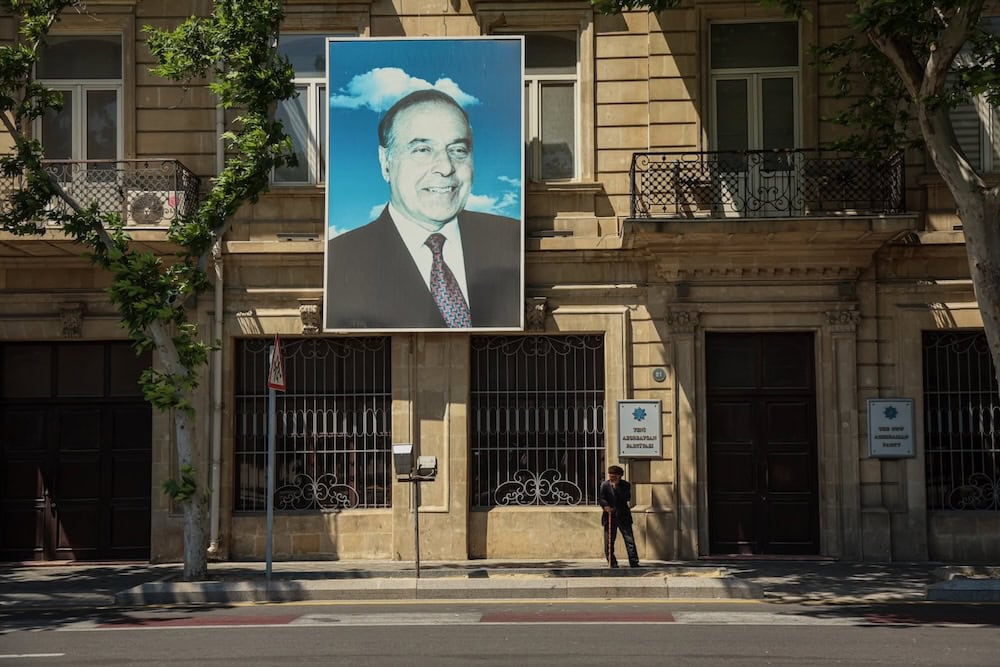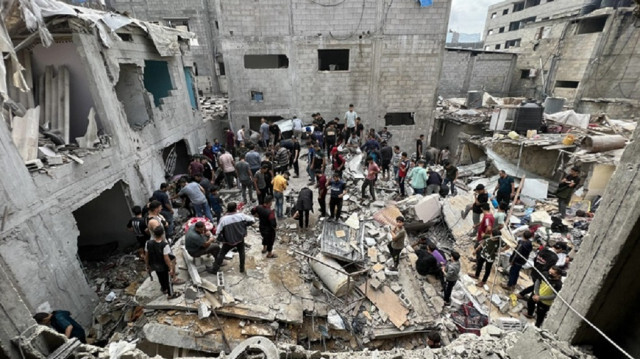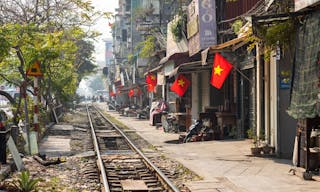Human Rights Watch
13 August 2024
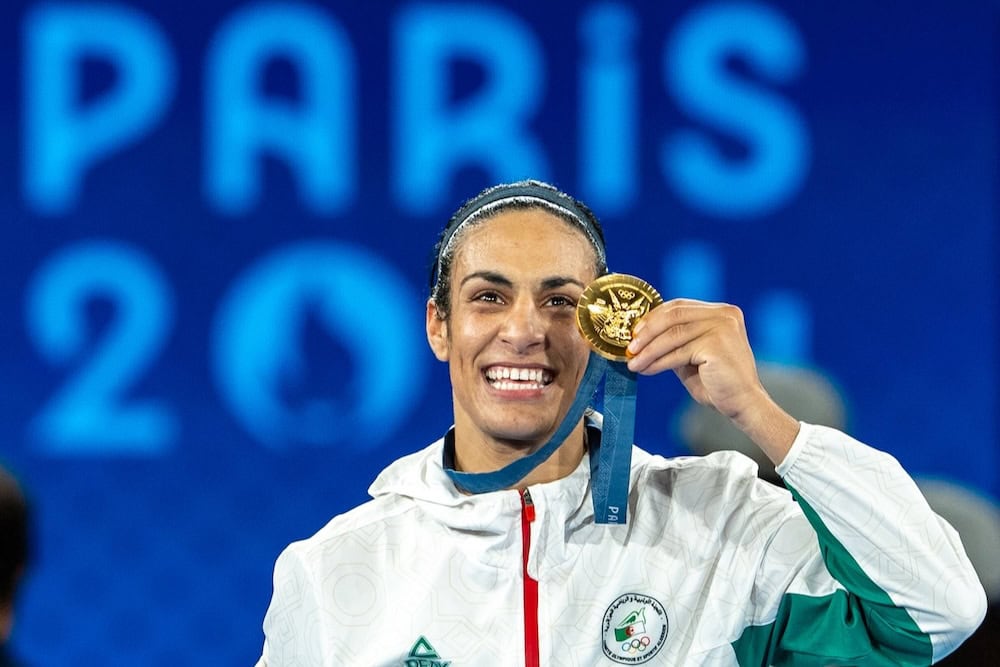
Boxer Imane Khelif of Team Algeria celebrates as she wins the gold medal at the Olympic Games, in Paris, France, 9 August 2024. Aytac Unal/Anadolu via Getty Images
"Sex testing has often relied on racist gender stereotypes. There is no scientific consensus that higher than typical endogenous testosterone in women confers an athletic advantage. There have never been sex tests for men, meaning sex testing is intrinsically discriminatory against women" - HRW
This statement was originally published on hrw.org on 8 August 2024.
Vitriol directed at boxers Is a product of discriminatory policies
An outpouring of vitriol against two women in the Paris Olympics boxing competition shows the immense harms “sex testing” policies cause and how important the International Olympic Committee’s (IOC) framework for inclusion is to women’s rights.
Taiwan’s Lin Yu-ting and Algeria’s Imane Khelif were thrust into the spotlight last week thanks to the specter of sex testing regulations hanging over sport and the bigotry of some prominent individuals on the internet. The social media pile on, including by Elon Musk and J.K. Rowling, undermined the women’s privacy, dignity, and safety. Rumors and media leaks about women athletes’ anatomy have historically ruined lives, leading women to quit sport and in some cases seek asylum to ensure their safety.
The IOC has called out bigotry and disinformation. “I would ask everybody to respect these women, to respect them as women and as human beings. When you speak about human rights then you have the human right of every woman to participate in a women’s competition,” IOC President Thomas Bach told a press conference last week in Paris. IOC spokesperson Mark Adams said: “I need hardly say if we start acting on suspicions against every athlete of whatever, then we go down a very bad route.”
For decades, sport governing bodies have regulated women’s participation through “sex testing” regulations targeting women athletes who, often through variations in their sex characteristics, have higher than typical natural testosterone. Sex testing has often relied on racist gender stereotypes. There is no scientific consensus that higher than typical endogenous testosterone in women confers an athletic advantage. Besides, there have never been sex tests for men, meaning sex testing is intrinsically discriminatory against women. The vague language of sex testing regulations, the exclusive control over their implementation by sport governing bodies, and the arbitrary application of unscientific methods, trigger surveillance of women.
But there is also a history of athletes pushing back. In 2014, the Athletics Federation of India outed one of its women runners, Dutee Chand, for having high testosterone and banned her from competition. Chand took her case to the Court of Arbitration for Sport and was reinstated, and the global sex testing regulations for women runners were temporarily scrapped. Caster Semenya, the South African runner ruled ineligible for competition, successfully challenged the sex testing regulations at the European Court of Human Rights and awaits the outcome of an appeal against her victory.
Women’s equality in sport is an ongoing project, and movements for pay equity and accountability for sexual abuse are gaining momentum. Attempting to exclude women based on sexist and racist stereotypes only detracts from the bigger goal.
What to know about Olympic boxer Imane Khelif’s cyberbullying complaint
French investigators are looking into charges including gender-based cyber harassment and public insult after the gold medalist was targeted in online attacks.
Gold medal-winning Olympic boxer Imane Khelif has filed a legal complaint in France for alleged cyber harassment.
The Paris prosecutor’s office confirmed in an email Wednesday that it received the case that Khelif filed with its special unit for combating online hate speech. Investigators are looking into charges including gender-based cyber harassment and public insult.
This comes after a flurry of online attacks spreading false claims about her gender. Former president Donald Trump, author J.K. Rowling and billionaire Elon Musk were among those who referred to Khelif as a man or reposted such claims.
Imane Khelif and the gender controversy
Khelif is an Algerian boxer who won gold in the women’s 66-kilogram (146-pound) division at the Paris Olympics. During the Games, Khelif faced false claims online that she was a man or transgender.
The International Olympic Committee stood by Khelif as a Russian boxing chief, Umar Kremlev, repeatedly alleged without proof that a test revealed the Algerian boxer had XY chromosomes.
Khelif “was born female, was registered female, lived her life as a female, boxed as a female, has a female passport,” IOC spokesman Mark Adams said in a news conference Aug. 2. “This is not a transgender case.”
Kremlev heads the International Boxing Association. The IOC cut ties with the IBA last year over Kremlev’s connections to Russian President Vladimir Putin and other scandals. The IOC accused the IBA of running a Russian-backed “disinformation campaign against the Olympic movement.”
As female boxer Imane Khelif prepares for competition, International Olympic Committee President Thomas Bach stands by female boxers. (Video: The Washington Post)
Still, online vitriol grew as she advanced through the competition.
Rowling, Musk and Trump were among those who shared posts suggesting Khelif was not a woman after Italian boxer Angela Carini abruptly quit her round-of-16 fight against Khelif after being punched in the face.
In the news conference, Adams said he’d seen a lot of “damaging” misinformation on social media around the boxing case, and encouraged people to put themselves in the shoes of the athletes involved.
The complaint
A complaint for aggravated cyber harassment was filed with the Paris prosecutor’s office, Khelif’s attorney, Nabil Boudi, said in a statement Aug. 10 on X, adding that the boxer was subjected to a “misogynistic, racist and sexist campaign.”
“The unjust harassment suffered by the boxing champion will remain the biggest stain of these Olympic Games,” Boudi said.
Government investigators will look into the allegations and decide whether to submit cyberbullying charges. Under French law, such convictions can result in prison terms or fines.
Who was named in the complaint?
The complaint did not name the perpetrators, which is common under French law, according to the Associated Press, and gives prosecutors room to investigate anyone who could be culpable.
What has happened in other cases?
France has been working to combat cyberbullying and to reduce the dominance of U.S. tech companies. Other French cases of aggravated online harassment have resulted in prosecutions.
Almost 30 people were sentenced this year after a judge found them guilty of the online harassment of a French influencer, French network BFM TV reported, in one of the country’s largest cyberbullying cases to date. Lawyers representing the woman said in a news release that the severity of the sentences — up to 18 months in prison — was “unprecedented in a case of cyberbullying,” according to BFM TV.
Anti-bullying laws made harassment an offense in schools and universities in 2022, punishable with sentences of up to 10 years, and strengthened the obligations of tech companies to moderate school bullying on social media.
What Khelif said
Responding to the gender controversy, Khelif said: “I am a woman. I was born a woman and was raised a woman, and I compete as a woman.”
After beating China’s Liu Yang to claim the gold medal in the welterweight division, Khelif said, “My honor is intact now.”
“My message to the world — the whole world — is: Hold on to Olympic values and not bully people,” she said.
Les Carpenter contributed to this report.
By Rachel PannettRachel Pannett joined the Post's foreign desk in 2021 after more than a decade with The Wall Street Journal, where she was deputy bureau chief for Australia and New Zealand. Twitter
By Victoria BissetVictoria Bisset is a breaking-news reporter for The Washington Post's London Hub, covering the most urgent and consequential stories as they unfold on the European day.
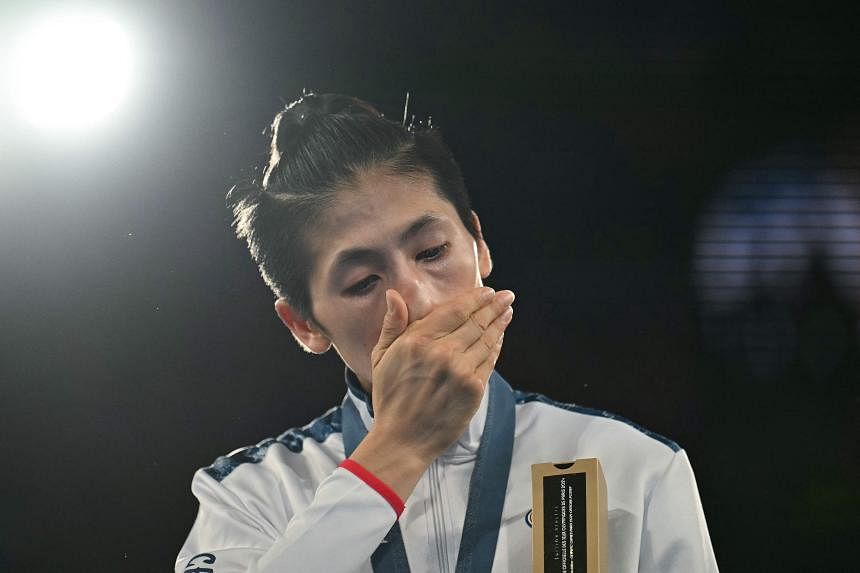
Aug 11, 2024
PARIS – Lin Yu-ting, one of two boxers at the centre of a gender dispute at the Paris Olympics, said staying off social media and focusing on her sport had helped her cope with nearly two weeks of international headlines over her eligibility for the Games.
Lin, who beat Polish opponent Julia Szeremeta to claim the women’s featherweight (57kg) gold on Aug 10, and Algerian Imane Khelif, were both caught up in a storm that has dominated headlines and been the subject of heated debate on social media platforms.
The two boxers were disqualified from the 2023 world championships by the International Boxing Association (IBA), which said a sex chromosome test had ruled both of them ineligible.
They competed in Paris after the International Olympic Committee (IOC) stripped the IBA of its status as the sport’s governing body in 2023 and took control of organising the boxing competition itself.
The IOC used boxing eligibility rules that were applied at the 2016 and 2020 Olympics and do not include gender testing.
“As an elite athlete during the competition, it’s important to shut myself off from social media and to focus. That is extremely important,” Lin said after her win.
“Of course, I heard some of the information through my coach, but I didn’t pay too much attention to it. I was invited by the IOC to participate at the Games, this is what I focused on.
“As for the other news, I relied on my coach to answer the questions. I just focused on who my competitor would be, I focused on training and being able to bring my A-game when I fought.”
On Aug 10, Khelif’s lawyer Nabil Boudi said the Algerian boxer had filed a formal legal complaint citing online harassment.
Asked if she would take similar measures, Chinese Taipei’s Lin said: “This is something I will discuss with my team. We will decide later what the next step will be.”
Lin, a two-time world champion, was overcome by emotion after the bout and moved to tears while standing on the podium.
“During the fight, I saw images flashing and I thought about the beginning of my career when I started boxing,” the 28-year-old said.
“All the difficult practice sessions, the times I got injured, the competitors I fought against.
“There were times of great pain and times of great joy. I cried because I was so touched.
“I represented Taiwan, I got the gold medal. I want to thank all the people in Taiwan who supported me, from the beginning to the end.”
Olympic gold has ‘special taste’ for boxer Imane Khelif after gender dispute
Chinese Taipei boxer Lin Yu-ting in Olympics gender row into final after ‘tough journey’
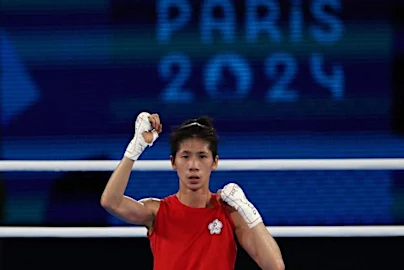
Khalokov and Jalolov added to compatriots Hasanboy Dusmatov, Asadkhuja Muydinkhujaev and Lazizbek Mullojonov’s wins, meaning Uzbek boxers have won gold in five out of the seven men’s categories in Paris.
Uzbekistan have won a total of eight gold medals across all sports in Paris, doubling their previous record haul of four in Rio.
Khalokov began the day by beating Kyrgyzstan’s Munarbek Seitbek Uulu by unanimous decision in the men’s featherweight (57kg) final. Australian Charlie Senior and Bulgaria’s Javier Ibanez took bronze after their semi-final defeats.
In the closing bout, defending Olympic, Asian Games and world champion Jalolov encountered little resistance from Spain’s Ayoub Ghadfa in the super heavyweight (over 92kg) final.
The towering Uzbek did well to keep out of his shorter opponent’s range and pick off shots whenever an opening presented itself to win by unanimous decision.
“This is history for Uzbekistan, and I’m emotional because becoming a two-time Olympic champion was my dream,” he said.
“Now, I feel very happy, and I will continue as a professional boxer.”
Uzbekistan’s success in the men’s field has been mirrored by China in the women’s tournament, with Li Qian beating Panama’s Atheyna Bylon in the middleweight (75kg) final to become the third Chinese woman boxer to win gold in Paris.
Before the Games, China had failed to win boxing gold in three editions since women were first permitted to box at the 2012 Olympics.
Taiwan’s Lin Yu-ting wins women’s featherweight boxing gold amid gender dispute
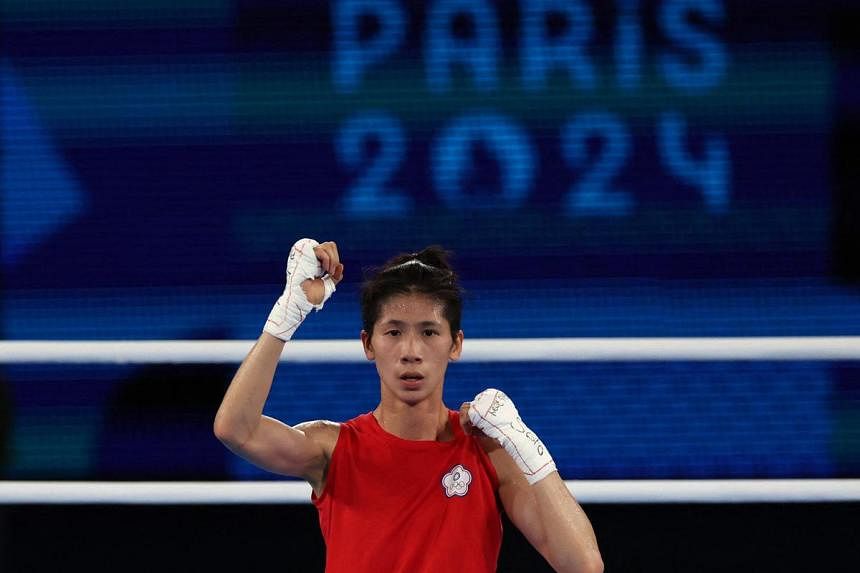
PARIS - Lin Yu-ting, one of two boxers at the heart of a gender dispute at the Paris Games, made light work of Polish opponent Julia Szeremeta to claim the women's featherweight title on Aug 10.
Lin and Algeria's Imane Khelif, who won gold in the welterweight category on Friday, have been in the spotlight as part of a gender dispute that has dominated headlines and been the subject of much discussion on social media platforms, triggering a legal complaint from the Algerian.
The 28-year-old Lin became Taiwan's first gold medallist in boxing, with the island having previously won only three bronze medals in the sport - two of which came at the Paris Olympics.
"I find it truly incredible," Lin told reporters. "I want to thank everyone who supported and believed in me; it’s what has kept me going until now. I've also written history for Taiwan to let the world know about it.
"Every match is challenging. Even though it might look like a 5-0 win, each match is a big test of whether my training foundation is solid.
"I think the fact that she could participate in the Olympics already is a testament to her skills," Lin, who carried her coach on her way to the medical check after the bout, told a press conference.
GENDER TEST
Lin and Khelif were disqualified by the International Boxing Association (IBA) from the 2023 World Championships in New Delhi, with the body saying in a shambolic press conference at the Paris Games that a gender test had ruled them ineligible.
The two boxers are competing at the Olympics after the International Olympic Committee (IOC) stripped the IBA of its status as the sport's governing body in 2023 and took control of organising the boxing in Paris.
The IOC has rejected the results of the IBA-ordered tests as arbitrary and illegitimate, saying there was no reason to conduct them.
At these Games, the IOC is using boxing eligibility rules that were applied at the 2016 and 2021 Olympics which do not include gender testing.
Taiwan President Lai Ching-te praised Lin.
"In the face of malicious and untrue disinformation, Taiwanese, whether they are the government or the people, regardless of political party, are united and refuse to let Yu-Ting be the target of false information attacks," he wrote on Facebook.
"Yu-Ting, you are amazing!. The distractions outside the ring will not affect your solid performance. You have shown more strength than other boxers of the same weight, and you have also won the support of boxers from all over the world who have fought against you."
Using her jab to keep Szeremeta at bay, Lin landed a couple of right hooks as the Pole was looking to break the distance.
Szeremeta was full of good intentions but lacked speed and accuracy, exposing herself to counter punches.
Nesthy Petecio of the Philippines and Turkey's Esra Yildiz were awarded bronze.
